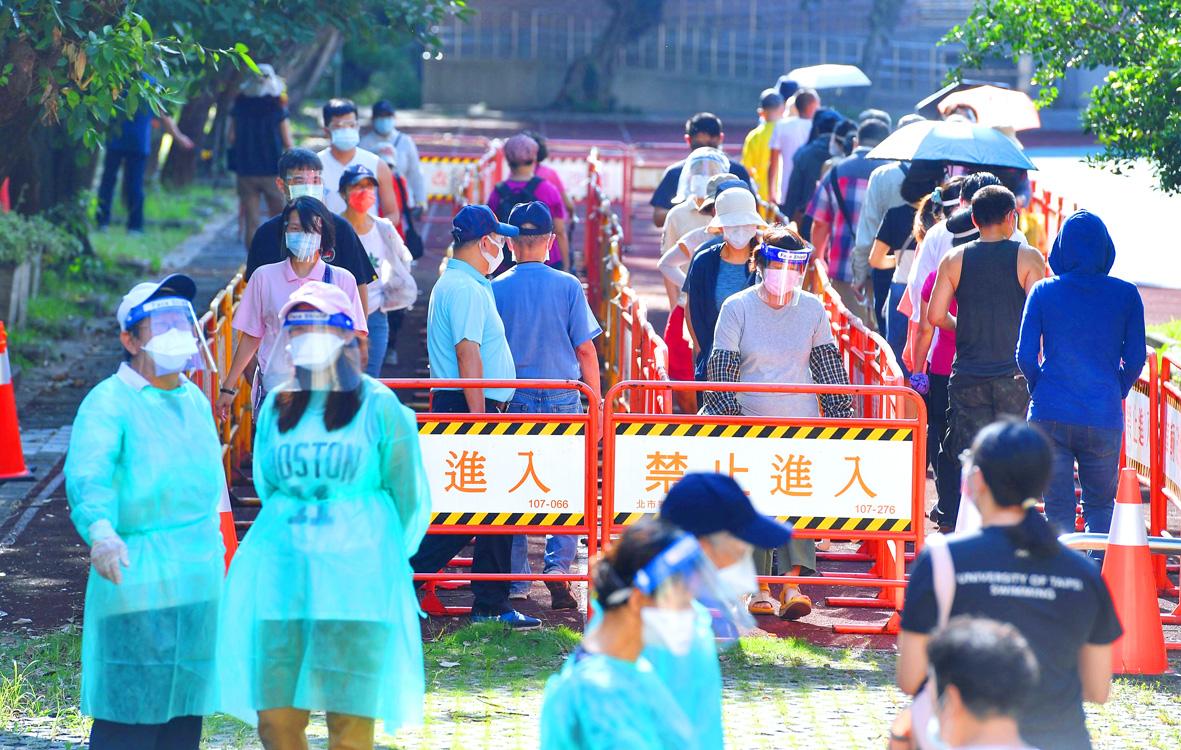The Taipei City Government yesterday launched the “Hulin Special Project” to expand COVID-19 testing for people living near Hulin Street in Xinyi District (信義), after a spike in COVID-19 infections was confirmed among residents in the area.
Thirty cases of COVID-19 from 13 households near Hulin Street, including three households that each have four cases, were confirmed between June 1 and Saturday, the city government said on Saturday.
Sixteen of the cases had been released after treatment, while 14 remained in isolation, it said, adding that 144 close contacts, excluding family members who live together, were also in isolation.

Photo: CNA
Taipei Mayor Ko Wen-je (柯文哲) on Saturday announced the Hulin Special Project, in which residents of eight boroughs were asked to register with their borough wardens for COVID-19 testing at Taipei Municipal Yong-Ji Elementary School yesterday.
The school’s testing station was expected to test 3,300 people, including an estimated 400 people from each of the boroughs and some vendors from the Hulin Street Market and Yongchun Market (永春市場), Ko said.
However, several borough wardens yesterday said that the plan was announced too abruptly, and that it had been difficult to compile lists of residents who wanted to be tested, as they had received an enormous number of telephone calls since the project was announced.
Many residents arrived at the site yesterday, only to be denied a test, as they had not registered beforehand. They were asked to return after 6:30pm to register for a test the following day.
Asked about the project yesterday, Minister of Health and Welfare Chen Shih-chung (陳時中), who heads the Central Epidemic Command Center, said it was implemented “relatively hastily.”
Chen suggested that people who have been in the area and experience suspected COVID-19 symptoms could be allowed to be tested at the station, and the city government could allow people to register for testing at the site using their identification cards, as is done at some hospital testing stations.
The city government said that 3,183 people had been tested at the site as of 5pm yesterday, and those who were not able to receive a test would be given a number so that they could be tested today.
Testing would continue as needed, he added.
Responding to accusations that the city government did not conduct contact tracing and was too slow in announcing the cluster infection, as the first case in the area was confirmed on June 1, Ko yesterday said that the 14 cases from five households were reported between June 14 and Monday last week.
It was not until Monday last week that the city government noticed that the area might have become a hot spot, so a provisional task force was set up on Wednesday last week, he said.

‘DENIAL DEFENSE’: The US would increase its military presence with uncrewed ships, and submarines, while boosting defense in the Indo-Pacific, a Pete Hegseth memo said The US is reorienting its military strategy to focus primarily on deterring a potential Chinese invasion of Taiwan, a memo signed by US Secretary of Defense Pete Hegseth showed. The memo also called on Taiwan to increase its defense spending. The document, known as the “Interim National Defense Strategic Guidance,” was distributed this month and detailed the national defense plans of US President Donald Trump’s administration, an article in the Washington Post said on Saturday. It outlines how the US can prepare for a potential war with China and defend itself from threats in the “near abroad,” including Greenland and the Panama

A wild live dugong was found in Taiwan for the first time in 88 years, after it was accidentally caught by a fisher’s net on Tuesday in Yilan County’s Fenniaolin (粉鳥林). This is the first sighting of the species in Taiwan since 1937, having already been considered “extinct” in the country and considered as “vulnerable” by the International Union for Conservation of Nature. A fisher surnamed Chen (陳) went to Fenniaolin to collect the fish in his netting, but instead caught a 3m long, 500kg dugong. The fisher released the animal back into the wild, not realizing it was an endangered species at

The High Prosecutors’ Office yesterday withdrew an appeal against the acquittal of a former bank manager 22 years after his death, marking Taiwan’s first instance of prosecutors rendering posthumous justice to a wrongfully convicted defendant. Chu Ching-en (諸慶恩) — formerly a manager at the Taipei branch of BNP Paribas — was in 1999 accused by Weng Mao-chung (翁茂鍾), then-president of Chia Her Industrial Co, of forging a request for a fixed deposit of US$10 million by I-Hwa Industrial Co, a subsidiary of Chia Her, which was used as collateral. Chu was ruled not guilty in the first trial, but was found guilty

The Chinese Nationalist Party (KMT) is maintaining close ties with Beijing, the Democratic Progressive Party (DPP) said yesterday, hours after a new round of Chinese military drills in the Taiwan Strait began. Political parties in a democracy have a responsibility to be loyal to the nation and defend its sovereignty, DPP spokesman Justin Wu (吳崢) told a news conference in Taipei. His comments came hours after Beijing announced via Chinese state media that the Chinese People’s Liberation Army’s Eastern Theater Command was holding large-scale drills simulating a multi-pronged attack on Taiwan. Contrary to the KMT’s claims that it is staunchly anti-communist, KMT Deputy